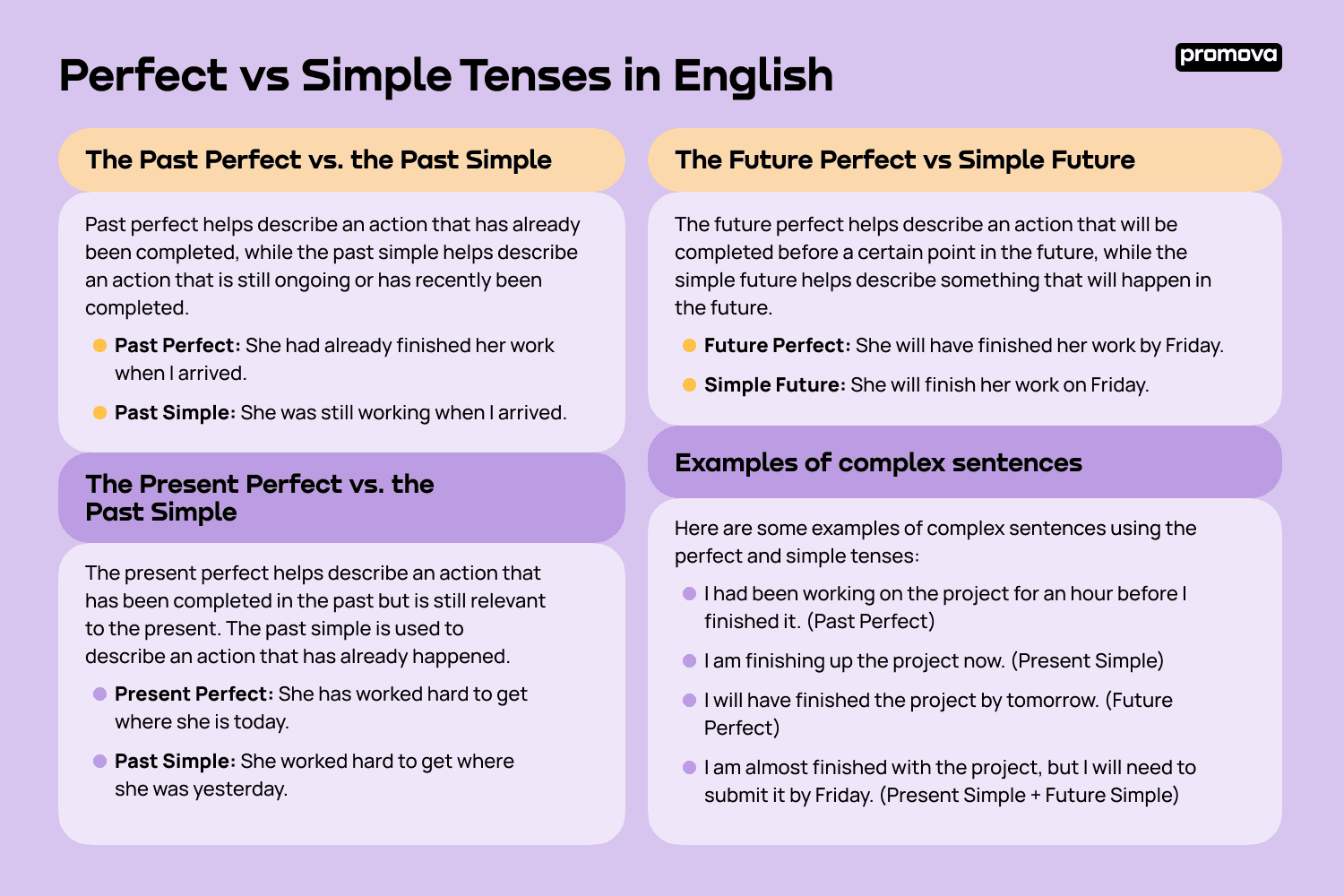Perfect vs Simple Tenses in English
Contents
English teachers often emphasize the importance of knowing when to use the perfect and simple tenses correctly. This reference will explain what the perfect and simple tenses are, how you can identify when to use them, and provide examples of each. Read on to learn how to use perfect and simple tenses in English.
What are the Perfect and Simple Tenses in English?
The perfect tense is a verb tense used to express an action already completed. On the other hand, the simple tense is used to express an action that is currently happening or is about to happen. Note that the perfect tense is not the same as the past tense, which is used to describe an action that happened in the past. The perfect tense is used to describe an action that is still ongoing or has recently been completed.
The perfect and simple tenses are the two main types of tenses used in English. The other tenses in English, such as the future and the conditional, are formed using the perfect and simple tenses.
2
How do I know which tenses to choose?
When deciding which tenses to use in a sentence, it is important to consider the context of the sentence. For example, if you are describing an action that has already happened, you would use the past tense. If you are describing an action that is currently happening or is about to happen, you would use the present tense.
Pay attention to the verb form that is being used. For example, if the verb is in the past participle form, then it is likely being used in the perfect tense. If your verb is in its present participle form, then it is likely being used in the simple tense.
The Past Perfect vs. the Past Simple
The past perfect and the past simple are the two main tenses used to describe an action that happened in the past. The key difference between them is that past perfect helps describe an action that has already been completed, while the past simple helps describe an action that is still ongoing or has recently been completed.
- Past Perfect: She had already finished her work when I arrived.
- Past Simple: She was still working when I arrived.
So, if you were describing an event that happened in the past, you would use the past perfect if you want to emphasize that the event has already been completed. You would use the past simple if you want to emphasize that the event is still ongoing or has recently been completed.
The Present Perfect vs. the Past Simple
The present perfect and the past simple are two tenses that are often confused with one another. The present perfect helps describe an action that has been completed in the past but is still relevant to the present. The past simple is used to describe an action that has already happened and is no longer relevant to the present.
- Present Perfect: She has worked hard to get where she is today.
- Past Simple: She worked hard to get where she was yesterday.
So, if you were describing an event that happened in the past but is still relevant to the present, you would use the present perfect. If you were describing an event that happened in the past and is no longer relevant to the present, you would use the past simple.
8
The Future Perfect vs Simple Future
The future perfect and the simple future are two tenses that are often confused with one another. The future perfect helps describe an action that will be completed before a certain point in the future, while the simple future helps describe something that will happen in the future.
- Future Perfect: She will have finished her work by Friday.
- Simple Future: She will finish her work on Friday.
For example, if you were describing an event that will be completed before a certain point in the future, you would use the future perfect. If you were describing an event that will happen in the future, you would use the simple future.
Examples of complex sentences
Here are some examples of complex sentences using the perfect and simple tenses:
- I had been working on the project for an hour before I finished it. (Past Perfect)
- I am finishing up the project now. (Present Simple)
- I will have finished the project by tomorrow. (Future Perfect)
Here are a few even more complex sentences with multiple clauses:
- I had been working on the project for an hour before I realized that I needed help, so I asked my friend for advice. (Past Perfect + Present Simple)
- I am almost finished with the project, but I will need to submit it by Friday. (Present Simple + Future Simple)
- I will have completed the project by the end of the week, and I am confident that it will be successful. (Future Perfect + Present Simple)

Summary
The perfect and simple tenses will comprise a lot of your speaking and writing in English. The perfect tense is used to express an action that has already been completed, while the simple tense is used to express an action that is currently happening or is about to happen. Consider the context of the sentence and the verb form being used when deciding which tense to use. Paying attention to these details will help you use the perfect and simple tenses correctly!



Comments